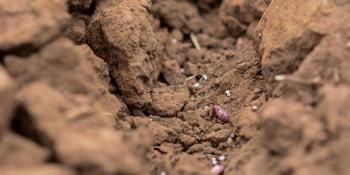Climate-smart agriculture in Côte d'Ivoire: what are the entry points for investment?
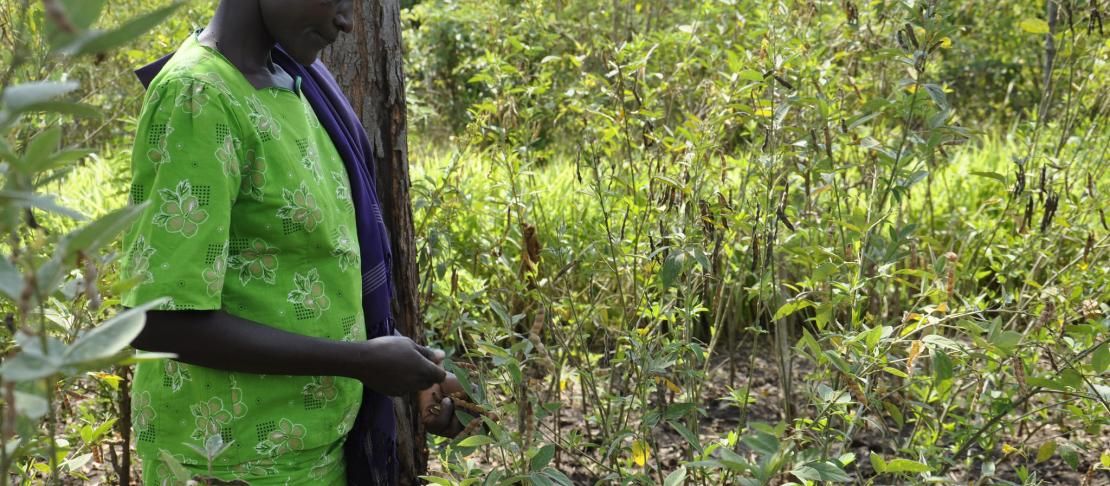
The climate-smart agriculture profile of Côte d’Ivoire defines entry points for investing into and scaling climate-smart practices to achieve sustainable development.
Climate change and weather variability continue to challenge the agricultural sector of Côte d’Ivoire. The projected impacts of climate change include extended periods of drought, loss of soil fertility and shorter growing season. It will affect especially the northern part of the country, and is expected to cause major economic losses and hunger for more than 70% of the households. Climate-smart agriculture (CSA) is proposed as a solution to guide actions needed to transform and reorient agricultural systems to effectively support development and ensure food security under a changing climate. The approach aims to tackle three main objectives: sustainably increase agricultural productivity and incomes; adapt and build resilience to climate change; and reduce or remove greenhouse gas emissions, where possible.
Currently, the mainstreaming of CSA into national agricultural development planning is sought for by many countries in West Africa in pursuant of their commitment to the 2015 Paris Agreement and the UN Sustainable Development Goals. To help countries succeed, it is imperative to identify, develop and appropriately package technologies and practices that underpin CSA and document the enabling institutions, policies and financial mechanisms in order to develop and promote practices. The development of CSA country profiles is based on this agenda and aims to define the entry points for investing into and scaling CSA.
Through the collaborative efforts of the Food and Agriculture Organization (FAO), the International Center for Tropical Agriculture (CIAT), the CGIAR Research Program on Climate Change, Agriculture and Food Security (CCAFS) and the International Crops Research Institute for the Semi-Arid Tropics (ICRISAT), the CSA profile of Côte d’Ivoire was developed. It provides baseline information that can open up national and global discussions about existing opportunities and enabling environments for CSA investments.
Excerpts from the CSA profile of Côte d’Ivoire
1. Overview of the agricultural sector
Agriculture is the main economic activity in Côte d’Ivoire contributing 21.2% to the country’s gross domestic product (GDP) and employing 46% of the labour force. The country is at the forefront of Africa for many agricultural products such as cocoa, rubber, palm oil, banana, pineapple, cotton, coffee, coconut, and cola nut. The agricultural sector in Côte d’Ivoire is confronted by several challenges including high deforestation, soil erosion, land tenure insecurity, weather variability and climate change which has manifested in the form of declining rainfall amounts, shortening length of the rainy seasons, rising temperatures, increased duration and rigor of dry seasons, as well as increased incidences of floods.
2. Climate-smart agriculture technologies and practices
While CSA practices exist in Côte d’Ivoire, most of the practices are not widely adopted. Documented CSA practices and technologies include:
- Banana/cocoa association
- Anti-erosion arrangement and structures
- Direct seedling on permanent vegetation crop
- Use of organic manure, composting
- Stone bunds
- System of Rice Intensification
- Anti-erosion structures
- Cover crops with leguminous and seeds pelleting
- Alley cropping
- Digging ponds to water herds
At present, the banana-cocoa integration system seems to be the most adopted, covering about 13% of the agricultural land. The widespread adoption of this practice was enabled by low technology needs, private sector engagement in the implementation and its multiple benefits such as food and income diversification and contribution to improved resilience of the system as a whole. Challenges to the adoption of CSA include lack of capacity building of farmers and limited access to information on available innovations.
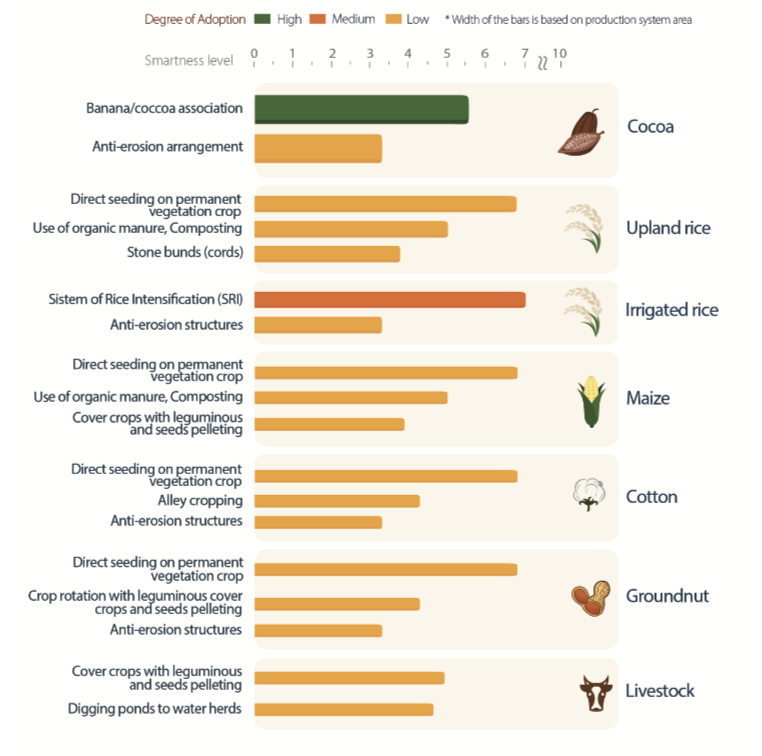 Selected CSA practices and technologies for production systems key for food security in Côte d’Ivoire. Source: Climate-Smart Agriculture in Côte d’Ivoire
Selected CSA practices and technologies for production systems key for food security in Côte d’Ivoire. Source: Climate-Smart Agriculture in Côte d’Ivoire
3. Greenhouse gas emissions
Total annual greenhouse gas (GHG) emissions are estimated at about 39 Mt CO2 eq. Agriculture contributes 12% of total GHG emissions with livestock contributing the largest proportion (63%). Livestock-based CSA practices are needed to support mitigation actions.
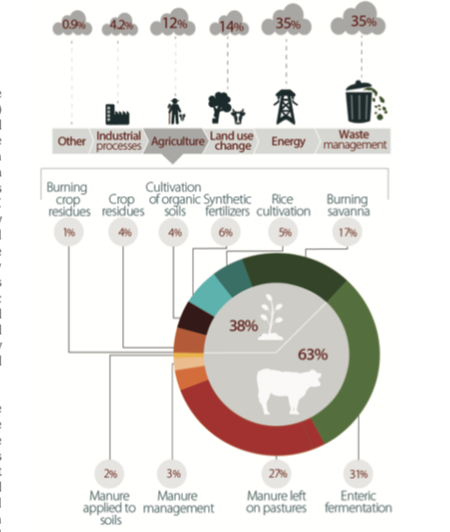
Greenhouse gas emissions in Côte d’Ivoire. Source: Climate-Smart Agriculture in Côte d’Ivoire
4. Enabling policies and institutions
Several policies, strategies, plans and programs are being implemented to fight climate change and promote CSA, such as the National Communication on Climate Smart Agriculture (NCCSA), the National Strategy for Disaster Risk Management (NSDRM) and the National Programme on Climate Change (NPCC). CSA policies and actions are implemented mainly by the Ministry of Environment and Sustainable Development (MINEDD), the Ministry of Agriculture and Rural Development (MINADER), the Ministry of Animal Production and Fisheries Resources (MIRAH) and the Ministry of Water and Forest (MIREF). The Institution for Aeronautical and Meteorological Development (SODEXAM) plays a key role in monitoring and sharing climate and weather information. There is limited involvement of civil society in CSA in the country.
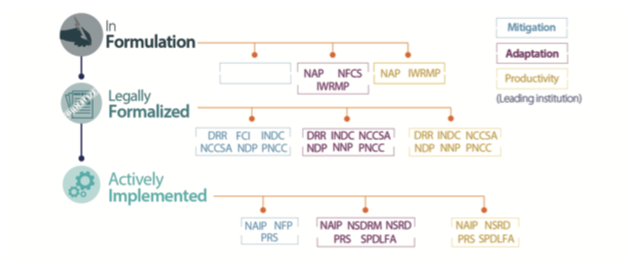 Institutions adopting CSA practices in Côte d’Ivoire. Source: Climate-Smart Agriculture in Côte d’Ivoire
Institutions adopting CSA practices in Côte d’Ivoire. Source: Climate-Smart Agriculture in Côte d’Ivoire
Financial sources and mechanisms for CSA
A number of projects funded by international organizations such as the World Bank, the International Fund for Agricultural Development (IFAD), Department for International Development (DFID) and the Deutsche Gesellschaft für Internationale Zusammenarbeit (GIZ) GmbH, foster the development of knowledge and evidence on the effectiveness of CSA. A continued partnership with these organizations could be a catalyst for access to larger CSA financing streams.
Although the country is eligible for multiple international climate finance instruments, such as the Green Climate Fund, funding for CSA is limited. Greater effort needs to be placed on accessing international climate finance instruments whilst ensuring the availability of local level public and private financing instruments for investments in the agriculture sector.
Read more:
Dansira Dembélé is a Communication Officer for CCAFS West Africa. Samuel T. Partey is a Science Officer for CCAFS West Africa.




